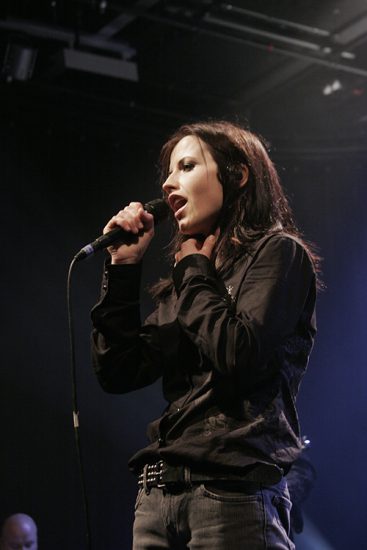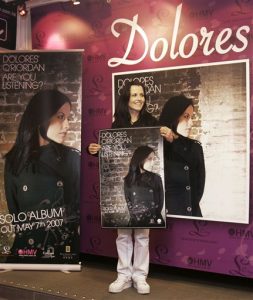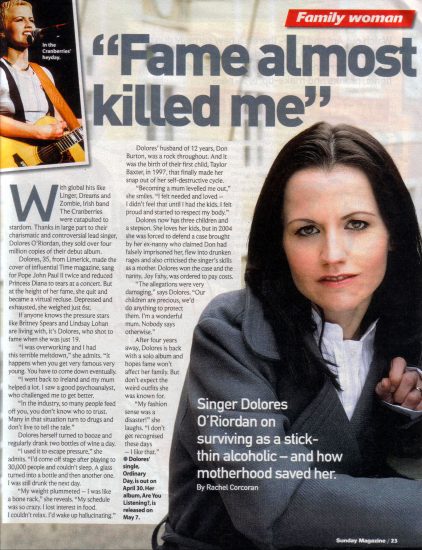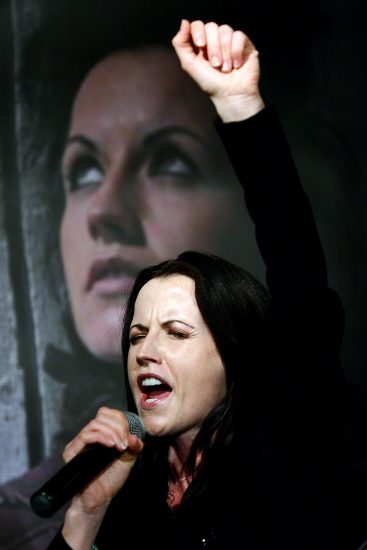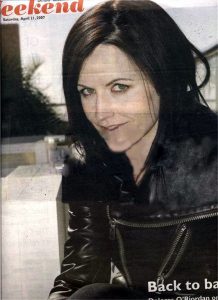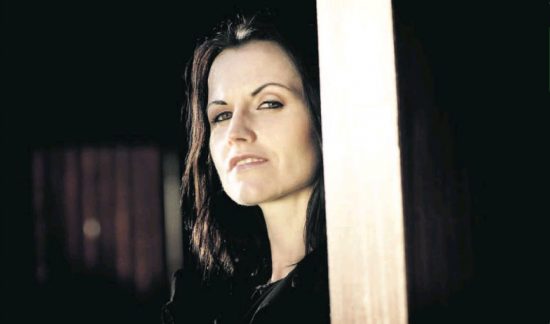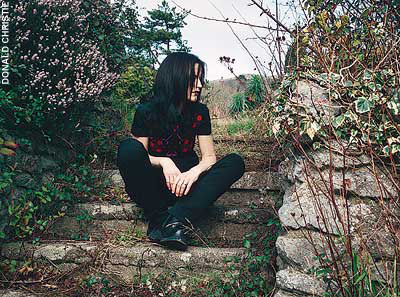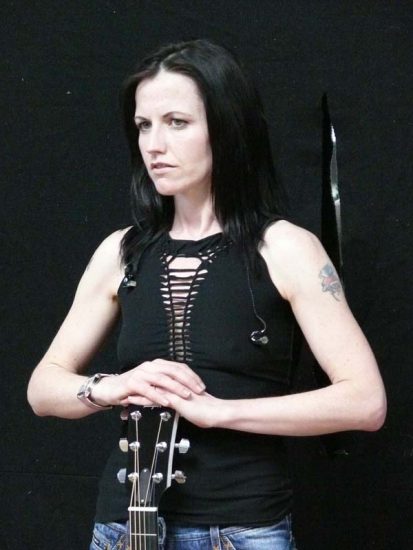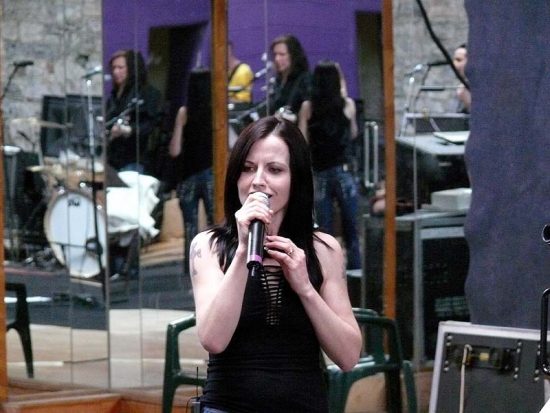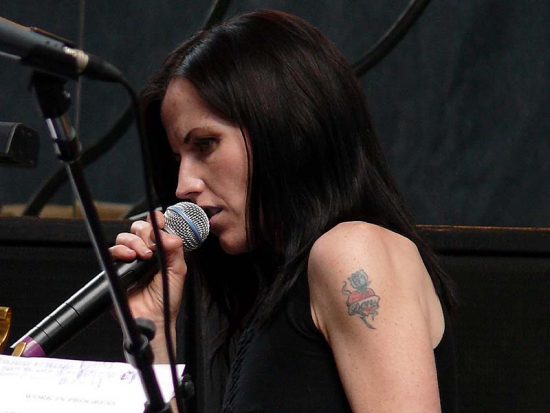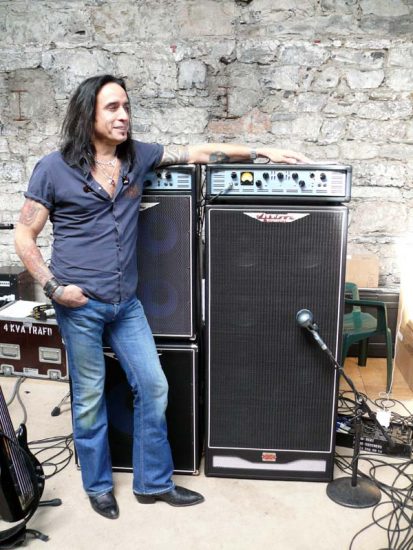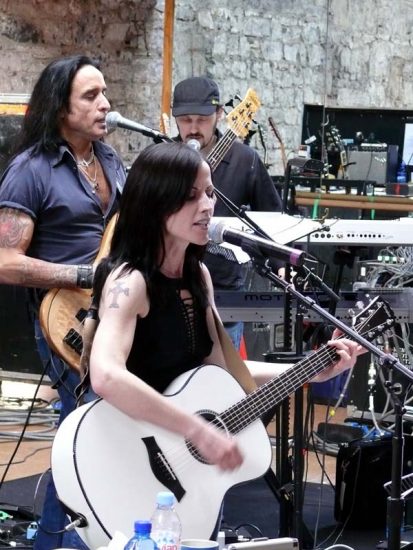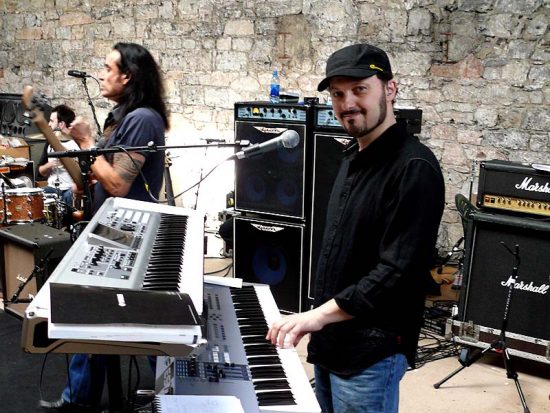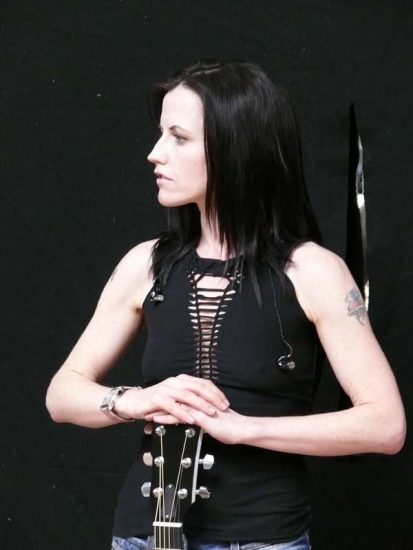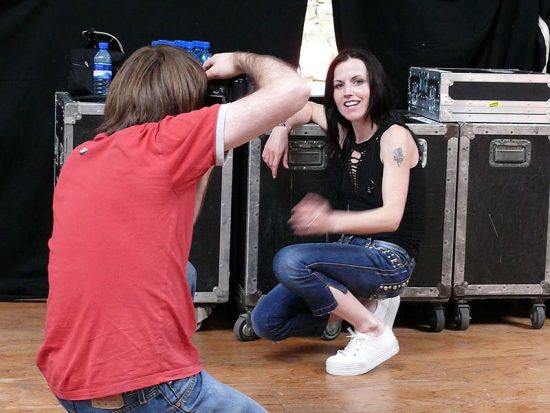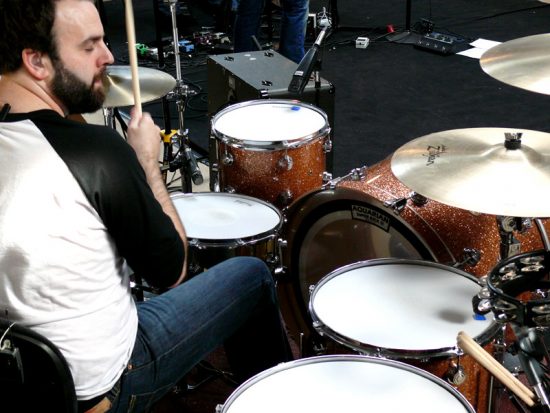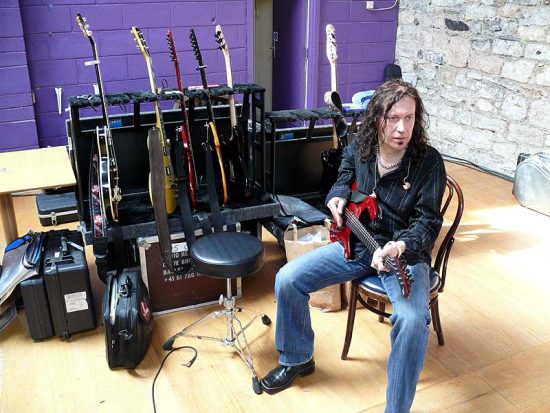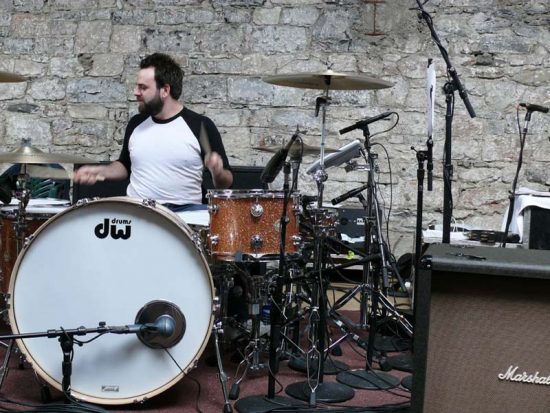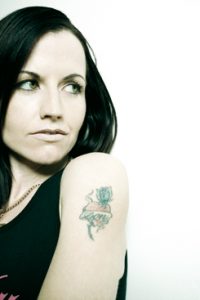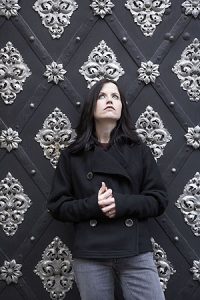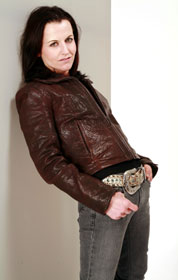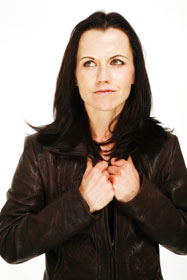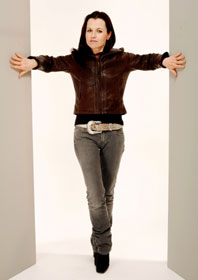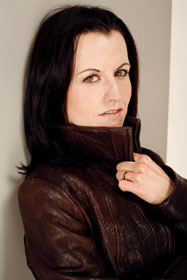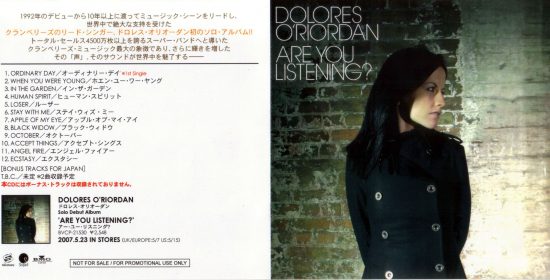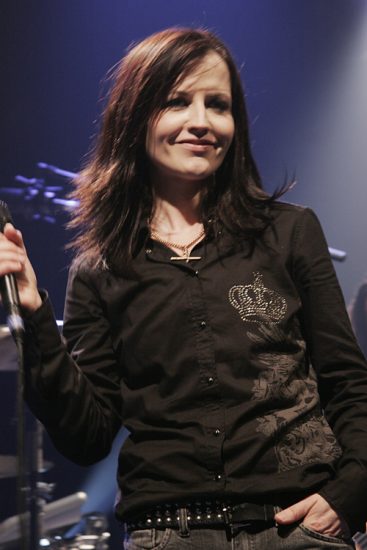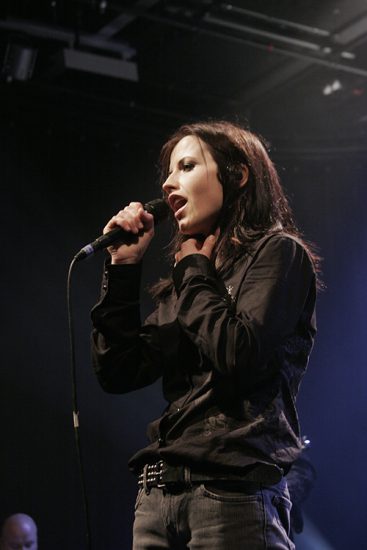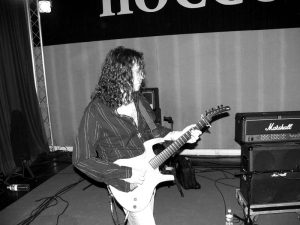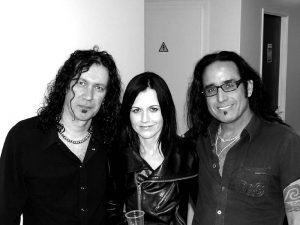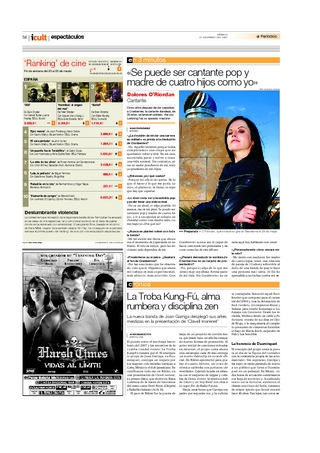Dolores O’Riordan has a stunning cover shot on the front of today’s Telegraph Magazine in the UK, a supplement to the Daily Telegraph newspaper.
The cover’s subhead is a bit backhanded — “What Dolores O’Riordan did when The Cranberries passed their sell-by date” — but the Telegraph has been known to produce some truly excellent interviews (not to mention one of our most favorite photos of Dolores ever), so you’re in for a treat.
Back in the swing
Last Updated: 12:01am BST 21/04/2007
Ten years ago the Cranberries were the biggest indie band in the world, but the pressure of fame caused singer Dolores O’Riordan to have a nervous breakdown. Now she is ready to face the world again – alone. By Craig McLean
Whatever happened to the Cranberries? In the early 1990s they were the little Irish band that had it all – four backwater teenagers from Limerick who formed a group, toured in a bread van, drank a load, had a laugh and, as if by magic, signed a six-album deal in London with the American arm of an international record label. The songs, co-written and sung by Dolores O’Riordan, were the key to their appeal. She was an elfin frontwoman with the voice of a giantess, a slip of a thing who could slip from Celtic etherealism to punchy arena-rock drama.
Dolores O’Riordon
Dolores O’Riordon: ‘I honestly think that it was beyond anorexia – it was bigger than that. I was having a nervous breakdown.’
Their songs and their sound – a U2-lite fronted by a less strident Sinead O’Connor – made them global megastars, particularly in America. The singles Linger and Dreams were huge hits, ubiquitous on MTV, radio, TV shows and over the PA systems in every high-street shop. In 1994, almost a year and a half after its original UK release, their debut album Everybody Else Is Doing It, So Why Can’t We? reached number one in the UK, its rise powered by the sheer momentum of their phenomenal American achievements.
O’Riordan, now 35 and preparing to release her debut solo album, Are You Listening?, remembers the madness of her first trip to America at the age of 19. ‘I was blown away, “Woah, this is so cool.”’ And then, ‘A few weeks later, every flippin’ establishment you walk into, you’re on TV. And you’re going, “Who’s that?” Which is kind of dangerous. “Oh, that’s the Entertainer, but I’m not that person.” That was how I used to try and deal with it, which isn’t very healthy really. I often see young people doing that, referring to themselves in the third person. At the time you think that’s OK. But later on you go, “That’s… crazy.”’
She was, by her own admission, a hopelessly naive country girl – one record company executive who met the Cranberries back then described O’Riordan as like ‘someone who’d fallen from space’. ‘I think there’s a difference between somebody who grows up in Paris or London and goes to Los Angeles,’ O’Riordan says. ‘But if you grow up in the green fields, and you rarely go into the city, you’re so overprotected that when you do go to LA it’s almost a bigger slap in the head.’
In their first flush of success in America, the Cranberries supported their hit debut album by touring with Suede, The The, Duran Duran and then, as O’Riordan remembers it, ‘tons of headline tours’. They played the huge Woodstock festival in 1994. On one tour they were doing two shows a night. And the hard work paid off: by the mid-1990s the Cranberries were the second-biggest Irish band in the world. They had Number One singles in 26 countries. By the end of the decade, propelled by the subsequent big hit singles Ode To My Family and Zombie, they had sold 28 million copies of their first three albums. Their singer, meanwhile, was often accorded the dubious accolade of ‘Ireland’s richest woman’.
advertisement
And then… what? The Cranberries slipped off the radar. There were another two albums, Bury the Hatchet, and in 2001, Wake Up and Smell the Coffee, but you could be forgiven for not noticing. Maybe the band barely noticed either. For a long time, almost since the release of their first album, O’Riordan, Noel Hogan (guitar), his brother Mike Hogan (bass) and Fergal Lawler (drums) had collectively given the impression of a band who didn’t much care for being wildly popular. O’Riordan, especially, was characterised as at best shy and withdrawn, and at worst moody and erratic.
Almost as soon as we have sat down on a sofa upstairs in her Dublin house, without being asked to, O’Riordan starts explaining. And explaining herself. She does this without much in the way of grammatical pauses, nor pauses for breath. ‘What happened was we did five albums with the Cranberries and then the Greatest Hits, and four years ago I decided to take time off and step away from the band. Because there was a lot of stuff going on behind the scenes that was much more important than being in a rock band. My husband Don’s mother, Denise, was diagnosed with cancer, and she was given eight months to live. We decided to go and stay there and help live her days with her, ’cause you don’t get those chances again, right? That’s the priority and she’s the children’s grandmother.’
From upstairs floats the sound of Taylor, nine, Molly, six, and Dakota, two, O’Riordan and husband Don Burton’s three children. (She has a stepson, Donny, 15, who lives in Toronto with his mother, Burton’s former partner.) A strapping Canadian a decade her senior, Burton was tour-managing Duran Duran when he and O’Riordan met. After a two-month courtship they were engaged, getting married in the summer of 1994. The bride, infamously, wore a see-through dress.
‘Behind the scenes as well as in the band there was a lot of illness,’ O’Riordan continues, oblivious to what is going on downstairs – her mother, Eileen, is on hand, as she is every day, to help with her children. ‘And when the Greatest Hits came out and we did that tour, I just felt I wanted to take a break, totally. Probably because, as well, I was so young when I got famous. I did album, tour, album, tour, album, tour, then I had a public nervous breakdown where I just lost tons of weight.’
In October 1996, after the release of their third album To the Faithful Departed, a burnt-out band cancelled the remainder of a world tour. O’Riordan, especially, simply wasn’t up to it. At the time she weighed six and a half stone, and she was racked with self-doubt. She had always been insecure – she readily volunteers that this was because, ‘I didn’t get a lot of attention from my dad when I was young. That’s a big part of it for girls. Because your dad is the first love of your life. If he doesn’t put you on his lap and give you a pet, you do end up not really liking yourself that much.’ Convent-educated O’Riordan is the youngest of seven children, and was raised in a strict Catholic household. Her father, Terence, was injured in an accident when she was a child, and so her mother had to support the family.
Receiving the adulation of countless thousands of concert-goers, it seems, was no help. That was the ‘wrong love’. Working and travelling but ‘having no friends around you, and no normal love, and no reality – of course you’re gonna turn into a kind of a lunatic eventually. So, it happened to me,’ she says, a broad smile fixed across her face.
advertisement
Was she anorexic? ‘I honestly think that it was beyond anorexia – it was bigger than that. I was having a nervous breakdown. Losing lots of weight. I wasn’t sleeping, I couldn’t eat. I was suffering an awful lot from out-of-control anxiety attacks. I just couldn’t control my motor skills – I was panicking too much to move my limbs.’
O’Riordan says that her paralysis would occur before going on stage, meeting strangers, ‘or sitting with strange people. It was very weird. It was a bit scary. So I went to see the psychiatrist and he just said it was too much stress.’
She began to recover, the healing process helped along by the birth of her first child the year after the diagnosis of her breakdown. But the fire had gone out of the Cranberries, and their music. They had spent the preceding six years racing to the top of the mountain. They would spend the next six sliding slowly down the other side.
It is a sunny Saturday in Dublin’s affluent outer suburbs. Howth is a millionaires’ playground, albeit one disguised as an unostentatious, family-oriented neighbourhood. The politician and businessman Feargal Quinn is a neighbour, Ronan Keating of the recently reformed Boyzone lives nearby. O’Riordan is back home for just a day. She is busy promoting Are You Listening?, her first job of work in four years, and right now she is in a different European country every day.
In writing songs for herself rather than a band, ‘there was an element of freedom that I’d never had before. When I wrote Black Widow [about her mother-in-law’s battle with cancer], it was my first time experimenting with dark music. I’ve always played around with aggression, happiness, sadness, but never darkness.’
Are You Listening? is a collection of well-crafted pop songs, not as maudlin, wishy-washy and lumpen as the Cranberries’ latter albums. Her remarkable voice, too, is less histrionic. The punchy Ordinary Days (dedicated to Dakota) and the ballad Apple of my Eye (about Burton) have melodies to rival those long-ago career-launching singles. On the big rock thumper, Loser, she doesn’t pull any punches (‘The moral of the adventure is this/Take me for granted, you are taking the piss’) but refuses to say who it is about, save that it is someone in the music industry.
As she bustles about the house she is cheerful and welcoming, with a slightly manic, chat-chat-chat edge. This could come of the speedy pace at which she and Burton are operating just now (he is managing her) after four years’ ‘retirement’. Or it could come from the ingrained trauma of the 1990s, and the subsequent therapy she underwent – she was a patient of ‘celebrity therapist’ Beechy Colclough, Harley Street confidant of everyone from Elton John to Robbie Williams and Kate Moss. It is hard to imagine how full-on and clenched she might be if she wasn’t a serious yoga addict (she does two hours a day).
Today her house is a base for the Telegraph photoshoot and the attendant frocks and finery – much to her daughters’ excitement, and much to her son’s consternation. For the first couple of years of their lives, Taylor and (for a shorter period) Molly were on the road with O’Riordan. But none of her children can remember mummy working, or being on television. Yet the past year, which O’Riordan has spent writing and recording her solo album in her home studios, here in County Dublin and in Ontario (their Canadian home is normally described as a log cabin, but one imagines it is rather grander than that), has coincided with dawning consciousness on the part of Taylor. ‘He’s been coming home from school and saying, “Mammy, my friends tell me that you’re famous and that you’re from a band…”’
O’Riordan and Burton have lived in this spacious, modern villa for three years. The walls in the hallway are covered with large-scale photographs taken at the children’s christenings – O’Riordan, glowing new mother in sleeveless dress, Celtic cross tattoo visible on one upper arm, loveheart tattoo on the other. Another shows her extended family, gathered after the ceremony, cheering for the camera. And Burton, beaming dad, in leather trousers and, in another, a pink brocaded suit.
Jostling for wallspace in the hall and up the stairwell are some of O’Riordan’s music-industry awards: the 1994 award from America for Most Performed Song on College Campus, for Zombie, O’Riordan’s heartfelt if clumsy song about the Troubles (‘In your head they are fighting/With their tanks and their bombs/And their bombs, and their guns’); an acknowledgement of the nomination of Zombie for an Ivor Novello songwriting award; silver, gold and platinum discs from South Africa, Australia and umpteen other countries.
advertisement
Downstairs, the children’s bedrooms, a riot of Bratz and Spider-Man duvets. Next door, the bathroom, with a pile of copies of Motor Boats Monthly and The Robb Report Collection (Real Estate and Interior Design) by the toilet. Opposite, the lounge-cum-bar. Finally, upstairs, in the loft-style space, is the office and O’Riordan’s little studio, easel (she loves to paint) and racks and racks of stagewear gathered over 10 years touring the world. All in all it’s fancy, but not as fancy as their previous abode: Riversfield Stud was a 150-acre farm in Kilmallock, near her hometown of Limerick. ‘This is a real family home,’ O’Riordan says. ‘We’re so much happier in this home than we were in the big place. That was very lonely.’
They had moved there in 1998, shortly after the birth of Taylor, at the height of O’Riordan’s traumas. She remembers being in Australia when her paternal grandmother died; she couldn’t get home for the funeral, because that would have meant halting the Cranberries’ tour. ‘It’s not just about you, it’s about all these people around you. There are hundreds of people depending on you.’ She had been forced to spend most of her first pregnancy in Canada, away from her mother. For an avowed family woman like O’Riordan, not to mention one feeling lonely and isolated already, this was a serious wrench. ‘While I was pregnant, my maternal grandmother passed away – I was in the morgue at her funeral, and there were paparazzi outside. I knew then that I had to get out of the country and go somewhere where I could recover and get away from it completely.’
Was buying the stud farm a continuation of that reclusive behaviour? ‘It was like my Neverland. I was having that, “God, who am I?” moment. But I couldn’t go out and walk around casually. People would come up and go, “If I had your money, I’d burn it.” But you couldn’t go to the pub and have one pint. So I built my own pubs and my own world. But you become a bit dysfunctional and a bit weird after a while. Too reclusive. ‘Sometimes I’d be asking the staff, “Will you come in, I’m lonely!”’ she cackles, her eyes wide. Nor did her young family ease her traumas. ‘The kids’ bedrooms were miles away. A different wing! They’re quite cheap those big old manors, you can buy them down the country for a couple of million.’
Amid the torrent of her speech, O’Riordan offers glimpses of what sounds like a terrible existence, where her fame and her wealth cursed both her and her family. She is from the countryside herself, and knows the ways of rural Ireland, but talks of her ‘sticking out’ in the little towns and villages. She says, ‘Imagine living in this big house and you can’t go out because somebody’ll throw stones at you or chase you. “Your mammy’s nee nee ne-ne neer,”’ she says in a sing-song sneer.
Finally, in 2004, they sold the house and most of the land for E4.5 million (£3 million). Now, in County Dublin, she only needs a housekeeper, and the children go to a local school ‘and we’re part of the community. It’s very safe, it’s much better for the kids. I can go out, walk around, nobody comes up to me. Some people ask for autographs sometimes, but that’s it.’
But being dubbed Ireland’s richest woman can’t have helped, I suggest. ‘Oh, it’s crazy. I flippin’ wish, man!’ Her reputed super-wealth was, she agrees, like a neon sign over her head. ‘Here she comes, who wants a free drink? Here, I’d like to build something, please charge me 10 times!’ she hoots, manically. The implication is that she was exploited, targeted. Indeed, in 2004 she and Burton were taken to court by their former child-minder, and accused of false imprisonment, breach of contract and negligence. The lawsuit failed. Equally, during my afternoon with O’Riordan, I overhear Burton talking about obsessive fans, in Belgium, Amsterdam and New Zealand, and how he has had to get Interpol involved.
‘It used to be upsetting,’ O’Riordan replies when I bring up the subject of overzealous fans. ‘I decided there’s nothing I can do about it by dwelling on it. So if I ever get anything weird I take it to the police, and they just deal with it. But you have to realise that it’s usually just a coward, someone trying to play with your head, mind games.’
It is time to take the photographs. We walk down to the nearby cliffs overlooking Dublin Bay, taking a route through the 2.5-acre plot overlooking the sea on which she and Burton are about to begin building a new house. Burton, a bit of a handyman, describes their plans for a three-level, 10,000 sq ft home, complete with swimming-pool, gym and recording studio. It seems that they will continue to live in the villa up the hill, though.
O’Riordan, resplendent in a Gucci dress, is radiant in every sense. She is still very thin, bony almost, and incredibly petite. But she is full of beans, even more so when Burton’s near to hand – she calls him ‘my rock, my pillar’. It is hard to imagine her even attempting a comeback without his steady management behind the scenes.
The Cranberries are not completely defunct, she says. ‘I stepped away from the group four years ago. I walked out of this big, big room I was in for a very long time into a smaller room, a different room, an interesting new room. But I didn’t shut the door. It’s kind of open.’ She says she is not in touch with ‘the boys’ (who all live in Limerick) – she says they were never that close in the first place – although Burton talks to Noel Hogan ‘a lot’.
‘I can’t really see myself going back immediately. The reunion that the Police are doing is quite respectable and quite decent because it’s 30 years since the split [it’s actually more like 20]. That sounds kind of cool. They’ve given it a good old break and did their own stuff.’
Two weeks later, Dolores O’Riordan plays her first live show in four years, an intimate, brief showcase event in the basement of the Hospital, an arts venue in London’s Covent Garden. She and her band – seasoned session players with a distinct whiff of gnarly old rock dudes about them – are dressed in black. She is in feisty form, kicking her white-trainer-clad feet high in the air. Her cover of In the Ghetto is cringy – too much melodrama, not enough soul – but the new songs sound as powerful as the old ones she plays, Dreams and Linger. Performing the hits that launched and then defined her, she says, holds no fear. ‘The audience always join in. And it’s, “Oh, fun time!” as opposed to, “I’m-performing-for-you time.” So the old energy’s going round the room like this…’ – she waggles her arms around her – ‘…in a circle, wooh!’
It is not so much a zen approach to rock’n’roll as a yogic one. And, in the end, it’s a grown-up approach – that of a woman who became famous while still a girl, and got trapped there. It has taken O’Riordan this long – and three children – to free herself. ‘I was obsessed with my career,’ she freely confesses. ‘It was my life, now it’s just a hobby. It’s fun. Thankfully, by making those decisions to have children when I did, I have the possibility now to have a second life with them. My mam said to me, “Careers come and go, but children are for ever.” It’s true. I’d hate to be a very successful career woman and have all this accomplishment, but have no children or grandchildren. Who’d be around when you were dying, like? Who’d mind you?’
# ‘Are You Listening?’ is released on May 7

